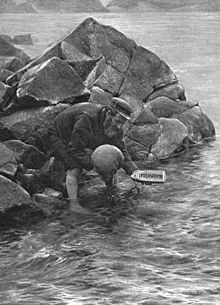
John Sands (1826–1900) of Ormiston was a Scottish freelance journalist and artist who also had an interest in archaeology and folk customs, especially the way of life on Scottish islands. He spent almost a year on St Kilda and lived on several other remote islands.
St Kilda

St Kilda is an isolated outlying archipelago in the Outer Hebrides of Scotland, and Sands played an important role in bringing the plight of the islanders to the world's attention. On his second visit Sands became stranded there in the winter of 1876–7, and during that time invented the "mailboat" by attaching a message to a lifebuoy salvaged from the wreck of the Peti Dubrovacki and throwing it into the sea. His book Out of the World was published in 1878 after his two visits to the archipelago in 1875 and 1876–7.

In 1877 he excavated the Taigh an t-Sithiche, an Iron Age souterrain. This unearthed the remains of gannet, sheep, cattle and limpets amidst various stone tools. The building is between 1,700 and 2,500 years old, which suggests that the St Kildan diet had changed little over the millennia. Indeed, the tools were recognised by the St Kildans, who could put names to them as similar devices were still in use. He publicly supported the St Kildans by, for example, writing to The Scotsman newspaper criticising MacLeod of Dunvegan, the island's landlord, for exploiting the residents. He also discovered that the Kelsall Fund, a bequest set up in 1860 to support the island's infrastructure, was unknown to the islanders more than fifteen years later and argued that those who paid taxes on tobacco and whisky were entitled to public services such as postal deliveries. It is possible his visits to St Kilda were in part prompted by his romantic interest in a young woman who lived there.
Sands spoke a little Gaelic and his only reading material whilst there was a Gaelic bible. He spent nearly a year on St Kilda all told, but his outspoken views created enemies. For example, George Seton published St Kilda in 1878 and:
using ridicule, traditional right-wing rhetoric and sarcasm, he sought to discredit Sands, calling him 'the theoretical philanthropist' and mocking his claims to divine inspiration.
Nonetheless, Sands's efforts were influential in creating a regular steamer service to Hirta, the only permanently settled island of the St Kilda group.
Other islands

Sands also spent time on the remote Scottish islands of Vaila, Papa Stour and Foula in Shetland, and also lived on Tiree in the Inner Hebrides and the Faroe Islands. Whilst on Foula he fought hard against the prevailing truck system and created political cartoons lampooning its deficiencies. In one, he drew Foula as a beautiful young woman being strangled by a boa-constrictor labelled 'landlordism' watched by other reptiles called 'missionary', 'laird' and 'truck'.
Later career
Sands spent the rest of his career as a freelance journalist, artist and poet, writing humorous articles for Punch magazine. He is occasionally described as a Member of Parliament. This may be due to a misinterpretation of his appointment in 1876 by the people of St Kilda as their fear-ionaid or representative in their attempt to arrange for a steamer to call twice yearly at the island. Seton mockingly described him as the "M.P. for St Kilda".
References
- General references
- Fleming, Andrew (2005) St Kilda and the Wider World: Tales of an iconic island. Macclesfield. Windgather Press.
- Maclean, Charles (1977) Island on the Edge of the World: the Story of St. Kilda. Edinburgh. Canongate.
- Steel, Tom (1988) The Life and Death of St. Kilda. London. Fontana.
- Specific references and notes
- "Perthshire-L Archives 2003-2" Archived 29 October 2007 at the Wayback Machine Rootsweb.com. Retrieved 6 October 2007.
- Steel (1988) page 180.
- Steel (1988) page 180.
- "St Kilda" Archived 3 February 2015 at the Wayback Machine The National Trust for Scotland. Retrieved 2 October 2007.
- Maclean (1977) page 26.
- Maclean (1977) page 127.
- Fleming (2005) pages 32, 152 and 154.
- Fleming (2005) page 153.
- Fleming (2005) pages153-4, quoting Seton, George (1878) St Kilda Edinburgh, pages 316-7, from a 1980 facsimile of the original.
- Fleming (2005) page 158.
- Fleming (2005) page 159.
- Fleming (2005) page 159. Fleming credits the source of this information as Nicolson, J. (3 July 1937) John Sands. Shetland Times.
- Fleming (2005) page 159.
- This mentioned briefly by Maclean (1977) page 117, and is repeated in the Rootsweb.com thread referred to above. No other evidence of him holding such office has emerged.
- J. Sands (1878). Out of the World, Or, Life in St Kilda. New York Public Library. MacLachlan & Stewart.
- Seton, George (1878) St Kilda. Edinburgh. Page 27. See Google books search Retrieved 8 October 2007.
Further reading
- Sands, J. (1877) Life in St Kilda. Chambers's Journal of Popular Literature, Science and Art. Edinburgh. Published in book form as Life in St Kilda or Out of the World in 1878.
- Sands, J. (1877) Notes on the Antiquities of St Kilda. P.S.A.S. Vol 12.
- Seton, George (1878) St Kilda. Edinburgh.